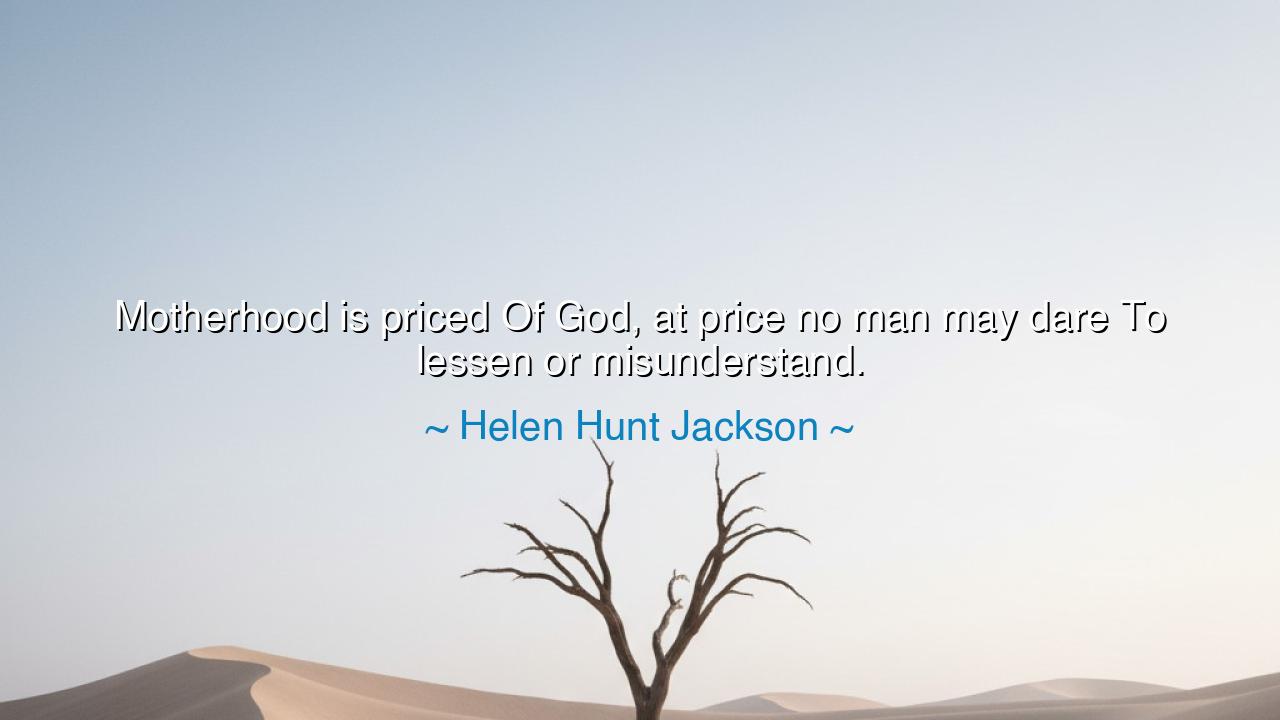
Motherhood is priced Of God, at price no man may dare To lessen






In the sacred and solemn words of Helen Hunt Jackson, “Motherhood is priced Of God, at price no man may dare To lessen or misunderstand,” we hear not merely poetry, but divine revelation. These words ring with the cadence of eternity, a proclamation that the bond between mother and child is not a human invention but a heavenly decree—a covenant written by the hand of creation itself. Jackson, a poet of compassion and justice, here captures the mystery of motherhood as both burden and blessing, sacrifice and sanctity. She reminds us that its value is beyond measure, beyond judgment, and beyond the comprehension of those who have not borne its weight.
Helen Hunt Jackson, a 19th-century poet and humanitarian, was a woman whose heart burned with empathy for the suffering of others. She fought for the rights of Native Americans when few dared to speak for them, and in her writings, she often celebrated the quiet power of love, duty, and endurance. This quote, drawn from her poem “Motherhood”, reflects her reverence for the maternal spirit—the force that endures pain yet gives life, that gives without expectation, and that stands closest to the divine in its capacity for unconditional love. The origin of her words lies in that recognition: that motherhood is not simply a social role, but a sacred calling—one bestowed by God, whose price is so high that none may diminish it without trespassing upon the holy.
To call motherhood “priced of God” is to say that it carries a worth set by heaven itself—a worth that no earthly currency can equate. For what coin can measure the cost of sleepless nights, of a heart stretched between fear and faith, of love that continues even when unreturned? Jackson’s words stand as a warning to all who would take this gift lightly, or judge the work of mothers as small. In her time, as in ours, the labor of women—especially that of mothers—was often unseen, unvalued, and unspoken. Yet she saw what others missed: that the hands which cradle the child also uphold the future of humanity.
The ancients understood this sacred truth. Among the Spartans, a mother’s courage was revered as equal to that of the warrior’s. Among the Israelites, the honor of the mother was bound to the command of God Himself. And in the story of Mary, the mother of Christ, we see the highest expression of Jackson’s belief: that the price of motherhood is divine, for it demands the full surrender of the self. Mary’s “yes” to the angel was not the consent of ease—it was the acceptance of suffering, of witnessing her child’s pain, of carrying both life and death within her heart. Through her, the world learned that motherhood is both holy and harrowing, its price beyond what any man may fully understand.
In history, we find countless reflections of this same sacred endurance. Consider Sojourner Truth, who bore the twin weights of slavery and motherhood. When her son was sold away, she fought with a mother’s fury until she brought him back—becoming one of the first Black women in America to win a case against a white man in court. Her courage was not born of privilege but of divine strength—the very strength Jackson names as “priced of God.” Sojourner’s motherhood was not gentle or easy, yet through it shone the indomitable spirit of creation itself. She proved that the love of a mother is a force that no injustice can silence and no law can bind.
To lessen or misunderstand motherhood, as Jackson warns, is to deny the divine in human form. For the mother is not only a giver of birth, but a builder of souls. Her influence shapes nations unseen, her teachings echo through generations long after her voice has fallen silent. Every great act of courage, every song of compassion, can trace its roots to the early nurturing of a mother’s heart. Thus, when society neglects or belittles the worth of mothers, it cuts the thread that binds humanity to its sacred origins.
Let this, then, be the lesson carried forth: honor the mothers, for through them flows the power of creation and continuity. To those who are mothers, remember the holiness of your work; do not measure it by praise or recognition, for its price is already known to heaven. And to those who are not, learn to see in every mother—your own or another’s—the reflection of divine endurance. Do not dare to lessen or misunderstand her sacrifice, but meet it with reverence and gratitude.
Thus, Helen Hunt Jackson’s words stand as both hymn and warning: that motherhood is not a duty of flesh alone, but a covenant of spirit. Its worth cannot be measured in wealth, its sacrifice cannot be fully spoken, and its love cannot be fully understood—except by the One who designed it. For in every mother’s heart, God Himself has written the price—and it is love, infinite and eternal.






AAdministratorAdministrator
Welcome, honored guests. Please leave a comment, we will respond soon